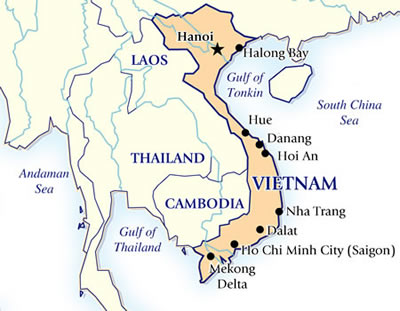Another farewell, another new begin. I think I got kind of used to it now, after almost six years of travelling. I was looking forward to my trip to South East Asia so much when I bought my plane tickets to Vietnam. However, my last month in Australia was probably my best and therefore leaving Sydney was not as easy as I had hoped.
Luckily exciting Vietnam makes me change ideas and I did not at all lay in bed nostalgically.

Saigon – learning about motorbikes, money and war
My start was in Saigon, or Ho Chi Minh City, south of the country. Getting out of the plane, driving to my hotel (first time to have my own room since months!), discovering the neighbourhood… all that was a wonderful feeling! So much culture, so much going on! Almost too busy, with all the motorbikes and noises everywhere. Quickly I had to learn how to cross a Vietnamese street – best is eyes closed, drivers will stop anyway and apparently the most common reason why there are accidents are pedestrians hesitating where to go while crossing the street. If I crossed a street like that in Germany I’d probably be in the newspapers on the next day, here it’s just everyday life.
Also, I had to get used to their currency – no coins at all, since they would not be worth a “penny”. One Australian Dollar is about 17.000 Vietnamese Dong, one Euro something like 25.000 Dong. To give you an idea about what life costs: One bottle of water between 9.000 and 15.000 Dong usually, a one course dish depending on the food and if it’s in a touristy area or not between 15.000 and 120.000 Dong. Amazingly cheap!
Saigon to me was a place where to learn about Vietnam’s interesting and at the same time horrible history. I have never been to a country that had to suffer so many wars. I visited the cu chi tunnels that were constructed by Vietnamese soldiers, the Viet Cong, and helped them to hide and fight against Americans and I also went to one of the most important war museums in the world, the war remnants museum where I learned historical facts, such as about the dangerous chemical agent orange used against the country. Those who were exposed to it, and also their descendants still suffer from serious health problems – during my journey I saw a couple of Vietnamese without hands, arms or other handicaps. Surely country’s history was presented subjectively, but even after my own reserches I strongly believe that the former American government bears the most blame for what has happened. I couldn’t help but felt very angry about how far people go to destroy other people’s lives.
However, and that was something that really surprised me a lot during my journey, I understood later that nowadays most Vietnamese have forgiven Americans and they are even very often known to be their “favourite” tourists: Apparently American culture, whatever that actually is, is something Vietnamese are very curious about and they want to live more this Western life style.







It’s sad and uplifting at the same time to see how quickly vietnamese people have forgiven americans. Of course, the americans of today are not really responsible for that war. Actually, the american citizens of that time are not responsible either. It’s just the governments that are to blame. During the war, every american hippie was on the streets, demonstrating for the war to end. I love how the Vietnamese don’t care about being resentful and just leave the past to the past.
It’s definitely one of the more interesting countries I want to visit in the future. the food is just amazing ❤
LikeLike
Thanks for your comment, merveilletravel.
Yes, I agree with you that the government at the time is to blame. So many people demonstrated against the Vietnam war, not only in the US but also in France and Germany for example. The Vietnam war became a metaphor for a whole generation standing up against governments, conservatism and their parents generation. I remember an American man saying in a documentary: “Within families the children were usually against the war, fathers in favour and mothers just trying to mediate if that was still possible. Cause in many cases there was no communication possible any more at all.”
Really interesting topic as I think.
LikeLiked by 1 person